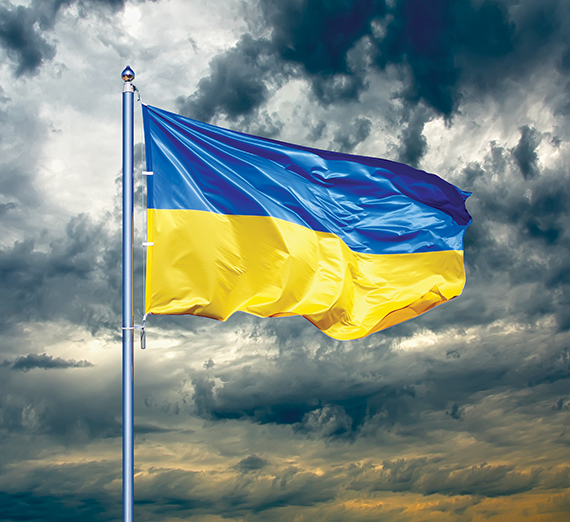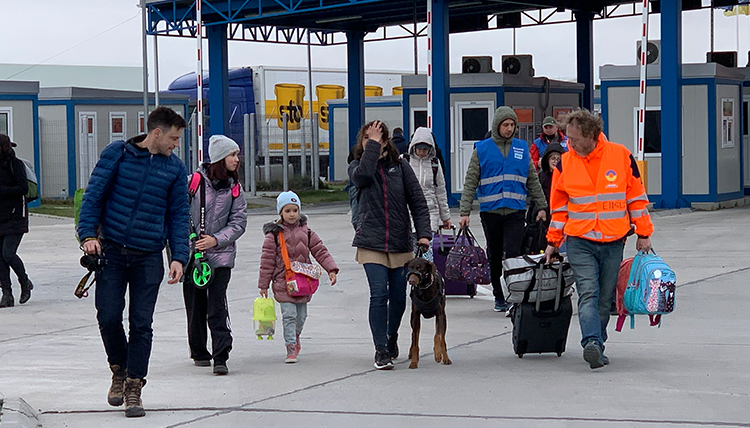Shedding the Same Tears

In late March, I spent several nights on the border of Ukraine and Poland at a refugee intake center covering the spiraling impacts of Russia’s invasion. Plum to the Polish border crossing, the center had the air of a particularly grimy festival or county fair: booths lined the entryway offering soup, coffee, food, diapers, pet food, cat carriers, clothing, medical services and more. Volunteers came from all over the world, hoping to help.
I was there for The Spokesman-Review, my employer, following a doctor from Spokane who’d volunteered to treat refugees. The women and children (mostly) crossing into Poland were fleeing the destruction of their homes and lives.
They were met with open arms. At all hours of the day and night they walked carrying their few possessions, the rumble of rolling suitcases a metronome of flight. Most had left a father, or son, behind in Ukraine. Under the country’s military law, no man between the age of 18 and 60 is allowed to leave. As they passed into Poland, volunteers ladled soup and treated injuries and the national government waived all entry requirements. Once in Poland refugees received transportation, schooling, money and housing.

Journalists from around the globe documented this historic outpouring of goodwill. Photographers from news agencies were positioned near the border 24 hours a day, spending an eight-hour shift glued to that spot just in case something important happened. While traveling in Ukraine, I met a journalist from San Francisco who’d been in Lviv for more than a month already. He had no return ticket. Other journalists were closer to the fighting, telling stories of horror and destruction. As of mid-May, seven journalists had been killed while on assignment in Ukraine.
The goodwill of the Poles and foreign volunteers was inspiring. The dedication and bravery of the journalists was tremendous; and yet I couldn’t help but think, where is the consistency?
A year before Russia invaded Ukraine, Syrian, Iraqi and Afghani refugees bunched up near the same border crossing. Instead of a warm welcome they were beaten by Polish border guards and forced back into neighboring Belarus. Reports from that time tell of families huddled together in the woods, trying to survive freezing nights, while guards and their dogs harried them.
These refugees had traveled across eastern Europe seeking asylum from wars no less vicious and evil than the current one in Ukraine. It’s similar on the United States’ southern border. Migrants and refugees are herded into cages, children pulled from families, fathers and mothers deported and dropped back into the violence they risked everything to escape.
And while there are journalists documenting these abuses, and aid workers trying to salve the sting, the scale is smaller and international concern muted, at best.
What’s the difference?
Certainly, there is the obvious one, skin color. The montage of Western writers and TV personalities wondering how bad things could happen to people that looked like them was cringey.
For example: A British writer at the Telegraph: “They seem so like us. That is what makes it so shocking. War is no longer something visited upon impoverished and remote populations. It can happen to anyone.
Or: “We’re not talking here about Syrians fleeing the bombing of the Syrian regime backed by Putin, we’re talking about Europeans leaving in cars that look like ours to save their lives,” said a French television journalist.
Beyond simple racism, there is an ideological reality to consider. Russia’s invasion has been framed as an assault on liberalism. The resurgence of totalitarianism. A battle for freedom. The Russians are called Orcs, a dehumanizing reference to the Lord of The Rings, and the fight has been framed as one of good versus evil. Light versus dark. Then there is the fact of nuclear weapons. A fact that means this war could quite easily end up killing us all.
These simple, easy to understand dichotomies provided us with some much-needed certainty. The war in Ukraine was, for two months, a hot topic. Everyone was thinking and talking about it. It was sexy, in the sense that it felt simple. Finally, after years of complicated and depressing headlines, this was a narrative that united the right and left. Putin is evil and his armies of “Orcs” are threatening the Western world order. A new Hitler, a buildup to another World War. Congress joined hands in shoveling money to Ukraine ($40 billion and counting), even as American families struggled to buy baby food and cash-strapped media outlets poured resources into covering the war.
Refugees’ stories were told with the empathy and compassion that anyone who is driven from their home by greed and egomania deserve. Countries opened their doors.
Questions of cost and long-term impact were ignored or deferred.
I benefited from this glut of interest. When I pitched my editors, asking them to send me to Eastern Europe, I expected a polite laugh. Next thing I knew I was on a plane to Poland.
Would this have happened if I’d pitched a story about the roughly 90,000 refugees still living in camps in Greece, or the 4 million Yemenis forced from their homes, or the thousands who trek through Central and South America hoping for a new life in the United States?
I don’t know because I’ve never thought to pitch these stories. I too was caught up in the drama of the Ukrainian conflict. To be clear, much of the drama is justified. The suffering is real and intense. And yet, that doesn’t change the fact that at 2 a.m. after traveling for two days through a war-torn land, a Ukrainian mother and a Yeminis father shed the same tears.
We populate our world with worthy and unworthy victims. A foible of humanity, perhaps, but one that I know can be curbed. After spending two months covering the war in Ukraine, I pray for two things: that this war ends, quickly; and that the outpouring of goodwill and kindness toward Ukrainian refugees’ balloons to encompass all those who suffer at the hands of madmen.
This comes from the Summer 2022 issue of Gonzaga Magazine's three-part feature on journalism grads. See also:
- "The World of My Heart" by Kristin Deasy ('07)
- "Turning the Tables" by Tom Miller ('72)
